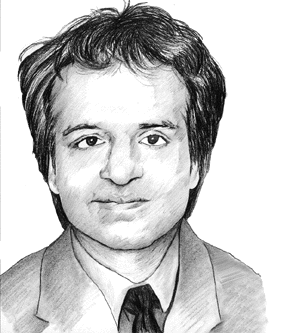INTERVIEW
Technical Analysis As A Statistical Process
Asoka Selvarajah Of Rabobank
International
by Thom Hartle
According to Asoka Selvarajah, markets do make sense ultimately, but not in a way that most people imagine. To understand the markets, according to Selvarajah, requires a dash of Pythagorean theory, a smidgen of Newtonian physics, and even some chaos. Selvarajah, who works for Rabobank International, one of the largest banks in the world and one of the few European banks in the world with a triple-A rating, was interviewed by STOCKS & COMMODITIES Editor Thom Hartle via E-mail over a period of several weeks in January 1998, discussing systematic trading and development as well as trading overseas markets.
We like to start with some personal history. What's your background?
I graduated with a bachelor's degree in physics and a doctorate in nuclear physics from Birmingham University in England. A fair part of my doctoral years were spent doing research at CERN, the particle physics institution in Geneva, Switzerland. Actually, the Internet was invented at CERN, and I guess I must have been one of the first to write his entire doctoral thesis as an Internet document, back in 1986!
What brought you to the financial arena?
I did the doctorate more out of interest and the challenge of it. The idea of pursuing a career in physics was secondary. When it came time to look for a job, I was not very sure what I wanted to do, but I did know that I wanted to continue to use the skills I had gained during my time as a scientist.
The markets can offer a real challenge.
The financial markets seemed to offer precisely the challenge that I was looking for because they require both quantitative and intuitive skills. It was also much better paid than science in the UK!
Did you start out with an interest in technical analysis?
No, quite the opposite! When I left university, the one book on the financial markets I had ever read was written by an efficient-markets fundamentalist. Therefore, that was the view I immediately adopted.
That's not unusual. Most technicians start out with a fundamentalist background.
It's funny in retrospect, because my approach to the markets is the opposite now. I remember one of my first job interviews turned out to be for the position of technical analyst. So, fresh out of university with my "one-book" mentality, I proceeded to explain very matter-of-factly to this senior technician why technical analysis could not possibly work! Guess what? I didn't get the job!
That must have been a sight!
Thankfully, this ignorant phase was short-lived. A healthy dose of reality soon put a stop to it. But you know, I still see a huge number of people in this business with that "one-book" mentality, who never look beyond the boundaries of their formal education, particularly if that "one book" happened to be a finance degree!
Would you describe yourself as a discretionary trader or a systems trader?
A bit of both. When I first started trading, it was purely discretionary, but always 100% based upon technical analysis. Nowadays, I would say that it is weighted at least 80/20 in favor of systems trading. While there is no discretion as to whether I take a system trade, I think it is important to retain a portion of my trading portfolio based upon technical views.
"The irrefutable science of one century always ends up being the superstition of the next. Finance will be no different."
